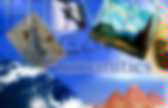

Christopher Columbus. Christopher Columbus (Italian: Cristoforo Colombo; Spanish: Cristóbal Colón; Portuguese: Cristóvão Colombo; born between 31 October 1450 and 30 October 1451, died 20 May 1506) was an Italian explorer, navigator, and colonizer, citizen of the Republic of Genoa. Under the auspices of the Catholic Monarchs of Spain, he completed four voyages across the Atlantic Ocean. Those voyages, and his efforts to establish permanent settlements on the island of Hispaniola, initiated the Spanish colonization of the New World.
Though Columbus was not the first European explorer to reach the Americas (having been preceded by the Norse expedition led by Leif Ericson in the 11th century[3]), his voyages led to the first lasting European contact with the Americas, inaugurating a period of European exploration, conquest, and colonization that lasted for several centuries. They had, therefore, an enormous impact in the historical development of the modern Western world. Early life Quest for Asia Background. Christopher Columbus - Biography - Explorer. “I went to sea from the most tender age and have continued in a sea life to this day. Whoever gives himself up to this art wants to know the secrets of Nature here below. It is more than forty years that I have been thus engaged. Wherever any one has sailed, there I have sailed.” “Speaking of myself, little profit had I won from twenty years of service, during which I have served with so great labors and perils, for today I have no roof over my head in Castile; if I wish to sleep or eat, I have no place to which to go, save an inn or tavern, and most often I lack the wherewithal to pay the score.”
“They say that there is in that land an infinite amount of gold, and that the people wear corals on their heads and very large bracelets of coral on their feet and arms; and that with coral they adorn and inlay chairs and chests and tables.” “This island and all the others are very fertile to a limitless degree, and this island is extremely so. Bartoleme de las Casas. Bartoleme de las Casas, a Spanish colonist, a priest, founder of a Utopian community and first Bishop of Chiapas, was a scholar, historian and 16th century human rights advocate.
Las Casas has been called the Father of anti-imperialism and anti-racism. Others take a more guarded or modest view of his achievements. What there is little or no dispute about is that Las Casas was an early and energetic advocate and activist for the rights of native peoples. Las Casas came to the Indies early, he knew Columbus and was the editor of the Admiral's journal. He knew conditions in the Americas first hand. After coming to the realization that the Spanish treatment of the native population was unconscionable, Las Casas became a Dominican priest, and began travelling back and forth accross the Atlantic. Because of preassures from the colonists, the encomienda system was restored. The advocates of the encomienda system eventually triumphed. Time Line Sources On Line Resources Where next? Fray Bartolomé de Las Casas (1484-1566) - Biography.
Bartolomé de Las Casas (1484-1566) Part One: Fray Bartolomé de Las Casas was a Spanish Dominican friar who became famous (or infamous, depending on your point of view) for his defense of the rights of the native people of the Americas. His brave stand against the horrors of the conquest and the colonization of the New World earned him the title “Defender of the Indians.” The Las Casas Family and Columbus: Christopher Columbus was well-known to the Las Casas family. Young Bartolomé, then about nine years old, was in Seville when Columbus returned from his first voyage in 1493 and may have met the Taíno Indians that Columbus brought back with him. Las Casas’ Early Life and Studies: Bartolomé decided that he wanted to become a priest, and his father’s new wealth allowed him to send his son to the best schools at the time: The University of Salamanca, and then later the University of Valladolid.
First Trip to the Americas: Mortal Sin: First Experiments: The Verapaz Experiment: Analysis: